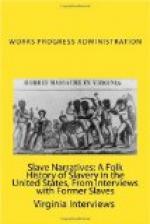“There was a colored man by the name of Joe Nick, called Old Nick by a great many white people of me city. Joe was owned by Rueben Rogers, a lawyer and farmer of Howard County. The farm was situated about 2-1/2 miles on a road that is the extension of Main Street, the leading street of Ellicott City. They never called me anything but Tomy or Randy, other people told me that Thomas Randall, a merchant of Ellicott City, was my father.
“Mother was owned by a man by the name of O’Brien, a saloon or tavern keeper of the town. He conducted a saloon in Ellicott City for a long time until he became manager, or operator, of the Howard House of Ellicott City, a larger hotel and tavern in the city. Mother was a fine cook, especially of fowl and game. The Howard House was the gathering place of the formers, lawyers and business men of Howard and Frederick Counties and people of Baltimore who had business in the courts of Howard County and people of western Maryland on their way to Baltimore.
“Joe could read and write and was a good mechanic and wheelright. These accomplishments made him very valuable to Rogers’ farm, as wagons, buggies, carriages, plows and other vehicles and tools had to be made and repaired.
“When I was about eight or nine years old Joe ran away, everybody saying to join the Union Army. Joe Nick drove a pair of horses, hitched to a covered wagon, to Ellicott City. The horses were found, but no Nick, Rogers offered a reward of $100.00 for the return of Nick. This offer drew to Ellicott City a number of people who had bloodhounds that were trained to hunt Negroes—some coming from Anne Arundel, Baltimore, Howard and counties of southern Maryland, each owner priding his pack as being the best pack in the town. They all stopped at the Howard House, naturally drinking, treating their friends and each other, they all discussed among themselves the reward and their packs of hounds, each one saying that his pack was the best. This boasting was backed by cash. Some cash, plus the reward on their hounds. In the meantime Old Joe was thinking, not boasting, but was riding the rail.
“Old Joe left Ellicott City on a freight train, going west, which he hopped when it was stalled on the Baltimore and Ohio railroad a short distance from the railroad station at Ellicott City. Old Joe could not leave on the passenger trains, as no Negro would be allowed on the trains unless he had a pass signed by his master or a free Negro, and had his papers.
“At dawn the hunters left the Howard House with the packs, accompanied by many friends and people who joined up for the sport of the chase. They went to Rogers’ farm where the dogs were taken in packs to Nick’s quarters so they could get the odor and scent of Nick. They had a twofold purpose, one to get the natural scent, the other was, if Old Nick had run away, he might come back at night to get some personal belongings, in that way the direction he had taken would be indicated by the scent and the hounds would soon track him down. The hounds were unleashed, each hunter going in a different direction without result. Then they circled the farm, some going 5 miles beyond the farm without result. After they had hunted all day they returned to the Howard House where they regaled themselves in pleasures of the hotel for the evening.




